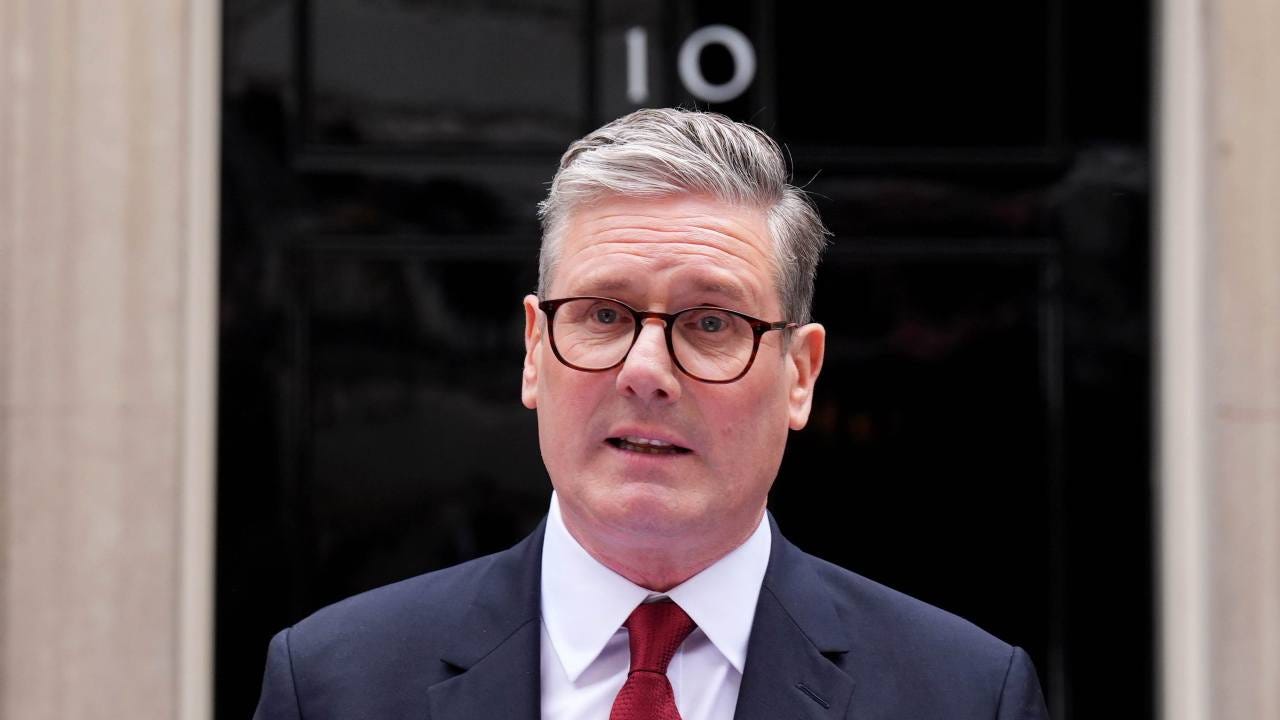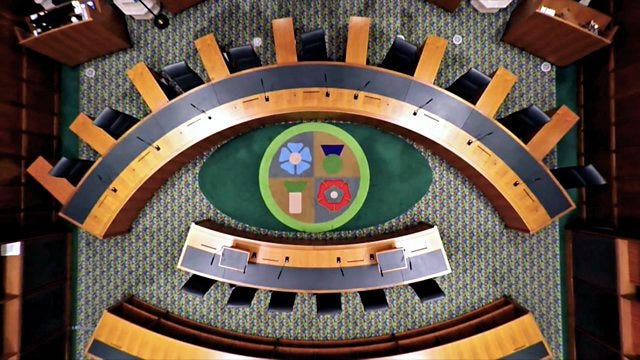Is the West Heading Towards Anarcho-Tyranny & Does the UK's Former Top Prosecutor Becoming Prime Minister Suggest a Shift in the Separation of Powers?
The Increasingly Authoritarian West is Being Run by Foxes
Keir Starmer’s rise from Director of Public Prosecutions (DPP) to UK Prime Minister is a significant achievement but one which raises important and critical questions about the balance of power in British governance.
As the country’s top prosecutor, Starmer was responsible for overseeing criminal prosecutions and ensuring that justice was served impartially. Whether he did that or not is up for debate but, setting that discussion aside, the role demanded rigorous legal expertise and a commitment to upholding the rule of law.
However, now that Starmer has moved from his legal role to the highest political office in the UK, his recent actions during last week’s riots - pushing for quick and harsh sentences, threatening freedom of speech and seemingly encouraging the public shaming of convicts - are not just routine governance. Worryingly, they hint at a deeper shift in the delicate separation of powers that underpins British democracy, with troubling implications that could bring us closer to a state of anarcho-tyranny.
To fully understand my concerns, it is essential to first grasp the concept of the separation of powers - a foundational principle in democratic governance.
In the UK, as in many Western democracies, power is divided amongst three branches: the executive (the government, led by the Prime Minister), the legislature (Parliament) and the judiciary (the courts). Each branch has distinct roles with the executive implementing laws, the legislature creating the laws and the judiciary interpreting and applying these laws. With this three-way division of power, no single branch should be able to dominate and it creates a system of checks and balances to protect individual freedoms whilst maintaining the rule of law.
An extremely critical component of this balance is judicial independence. Judges in the UK are expected to interpret and apply the law without interference from politicians. This is meant to ensure that justice is administered fairly, without bias or pressure from those in power.
But, due to the UK not having a written constitution, this separation of powers is both complex and flexible, with the relationships between the three evolving over time. For example, before the creation of the Supreme Court, the highest court in the land was the House of Lords but this also has legislative functions. Some thought that the Supreme Court (which was founded in 2009) would strengthen the separation of powers but instead it has only brought new tensions as it has started to assert its role in politically sensitive cases.
The most high-profile of these was a Brexit case - Miller II - in 2019, where the Court ruled that Boris Johnson’s (Prime Minister at the time) decision to prorogue (suspend) Parliament was unlawful. For many Remainers, this was a necessary intervention to prevent executive overreach - the rule of law had triumphed. But for millions of individuals who voted for Brexit, this was seen as a troubling encroachment by the judiciary into political territory, siding with the establishment over the people.
Now that Starmer is Prime Minister, the concerns about this contentious relationship between the judiciary and the other branches of government have taken on new urgency. His approach to law enforcement as DPP is now clearly influencing his political decisions.
According to this Sunday Times article, the riots were a crisis that Starmer’s career was made for. He was worried that the Crown Prosecution Service and courts wouldn’t be proactive enough so “he leaned really heavily on the justice system”.
“He leaned really heavily on the justice system,” said one official. “He knew from experience that people needed to see the system working to amplify the political message that rioting would not be tolerated. Prosecutions and sentences needed to be very visible.”
Another source added: “He was working from the playbook he knew from 2011. From last weekend he was making it very clear that we didn’t just need to be arresting and charging people — we needed to be pushing them through the system as a very public deterrent. He personally led it.”
This ‘leaning’ on the justice system and demand for quick and harsh sentencing is not just about maintaining law and order. It could be seen as an attempt to influence the judiciary to achieve political goals, directly challenging the principle of judicial independence that is so crucial to a functioning democracy.
But Starmer’s actions don’t stop there.
He has also made some very big moves that threaten freedom of speech, calling for stricter controls on what can be said in the public sphere, including online. This raises significant concerns about the potential for state censorship and the suppression of dissenting voices - core elements of any authoritarian regime.
Furthermore, it seems as if Starmer has encouraged the Home Office and the police to publicly name and shame those convicted of crimes by broadcasting their identities on social media and in the press. This is similar to historical practices of public humiliation and raises serious ethical and legal questions which I haven’t seen anybody raising. Public shaming can lead to severe consequences for individuals and their families, including social ostracism, harassment and even violence. Perhaps there is a case to argue that these public shamings have also incited hatred and whoever ordered them should be arrested on the same grounds as people who have been incarcerated for their retweets.
It also undermines the principles of rehabilitation and reintegration, goals that are meant to be key in the criminal justice system. This use of public shaming by the state not only violates the dignity and privacy of individuals but also risks turning the legal system into a tool of social control. Punishment is handed out, not just by the courts, but by the court of public opinion to people who are often young, poor unemployed and with mental issues. This further disenfranchises the very same communities that were rioting in the first place.
Are we on the path to a version of ‘anarcho-tyranny’? This is a situation where the state is both overly intrusive and ineffective. It is where the government fails to maintain law and order but simultaneously imposes oppressive control on the populace. In an anarcho-tyrannical state, laws are enforced selectively, with the government cracking down harshly on some offenses whilst turning a blind eye to others. This creates a society where law-abiding citizens are subjected to increasing restrictions and penalties, while actual criminals often go unpunished or are treated leniently.
How often do we read about an individual with child pornography getting a slap on the wrist. Or a rapist getting let out of prison after a few months. Good luck getting a police officer to your house if it is burgled. What about the petty thieves that brazenly steal in full view because they know they won’t be stopped. But a retweet can get you locked up for three years.
These examples combined with Starmer’s harsh sentencing demands, his threats to freedom of speech and the encouragement of public shaming all fit the description of anarcho-tyranny disturbingly well. On one hand, the government appears to be doubling down on punitive measures and controlling the narrative. Whilst on the other hand, it risks becoming increasingly ineffective at addressing the root causes of unrest and crime. Instead it focusses on managing the public’s perception through censorship and social control.
This is where the insights of historical thinkers like Niccolò Machiavelli and Vilfredo Pareto become particularly relevant. This piece by N.S. Lyons covers it well. Machiavelli famously described two archetypes of leadership: the cunning fox, who excels at manipulation but is weak in direct confrontation and the strong lion, who relies on raw power but is vulnerable to deceit. Pareto expanded on this idea, observing that societies often begin with lion-like leaders who establish order through strength but eventually come to be dominated by foxes - the bureaucrats and intellectuals who prefer manipulation over direct action.
In modern Britain, we see a society increasingly dominated by foxes. This is both a left and right wing issue with leaders who are uncomfortable using force, preferring to manage problems with manipulation and control. However, when real threats do emerge, such as the recent rioting, these foxes resort to force but in an inept and indecisive way. Starmer’s recent actions are classic fox-like manoeuvres because he is attempting to assert control whilst maintaining the façade of justice and order.
But this approach always backfires. It further destabilises the system by undermining judicial independence, it erodes public trust in the system and suppresses fundamental freedoms. What Britain needs now is not more foxes, trying to maintain the crumbling status quo, but lions who can lead with strength and restore balance and order.
Sadly, it seems that Britain’s current trajectory is heading in the opposite direction. Starmer’s actions signal a shift towards a more authoritarian government with the executive’s influence over the judiciary growing unchecked. With individual freedoms increasingly curtailed, this shift risks pushing the UK closer to a state of anarcho-tyranny where the government’s authority is both oppressive and ineffective. We will find ourselves trapped in a society where the rule of law is applied unevenly and unpredictably.
Sleepwalking towards tyranny must be avoided at all costs. And for those outside the UK, I’m sure you all realise that these issues aren’t confined to Britain alone. Western societies are witnessing increasing authoritarianism as economic growth stagnates, prosperity declines and as one weak leader takes over from another weak leader. At a very minimum we must ensure that the judiciary does not become politicised and speech remains free.







"But, due to the UK not having a written constitution, this separation of powers is both complex and flexible,..."
Here in the USA, we have a permanent constitution, but nobody reads it. We have separation of powers, but it's not between legislative, executive and judicial; it's between democrats and republicans.
In other words, it's as big of a mess here as there. This mess won't fix itself. It's up to us...
From across the sea it appears only certain speech is punished. It’s the worst of the worst of a tyrannical left wing government, and something the American left would love love to emulate if given the chance. Hope you guys get this fixed.